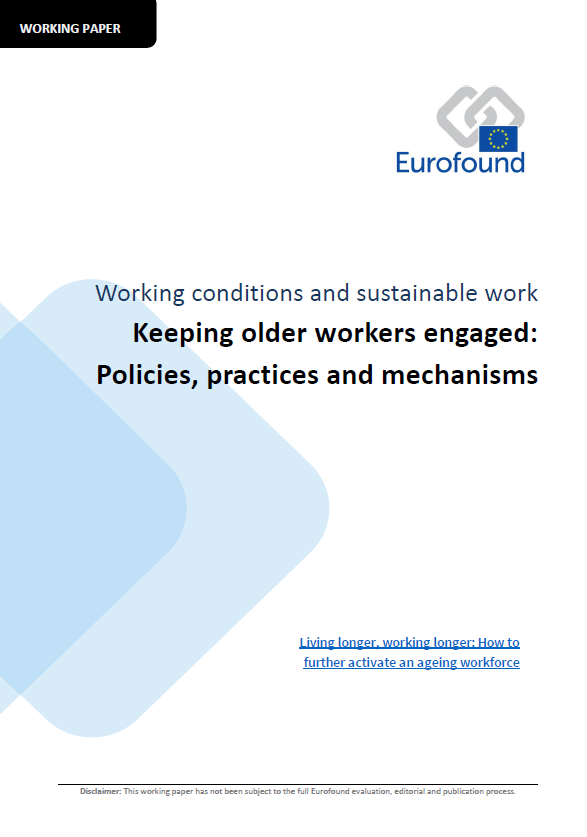EU context
Ondanks het feit dat nu in veel EU-landen aanzienlijk meer oudere werknemers een dienstverband hebben dan tien jaar geleden, maakt de Europese Commissie in haar gezamenlijk verslag over de werkgelegenheid (2017) toch melding van de mogelijkheid om dit percentage verder te verhogen. Waar de arbeidsparticipatie van alle werknemers tussen de 15 en 64 jaar in 2016 op 66,6% lag, bedroeg dit cijfer voor oudere werknemers tussen de 55 en 64 jaar in de EU inmiddels 55,3%. De grootste stijging was te zien onder oudere vrouwelijke werknemers.
Om te zorgen dat arbeidsmarkten zich aanpassen aan de nieuwe uitdagingen, maar tegelijkertijd billijkheid en solidariteit tussen de generaties aanmoedigen, kan de Europese pijler van sociale rechten als raamwerk dienen. Deze pijler benadrukt het recht van werknemers op een werkomgeving die aansluit bij hun professionele behoeften en die hun arbeidsparticipatie langer mogelijk maakt. Onlangs hebben de Europese sociale partners tevens een autonome overeenkomst over actief ouder worden en een intergenerationele aanpak ondertekend, waarmee zij zich inzetten om een actieve participatie van en een langer werkzaam leven voor oudere werknemers te faciliteren.
Het werk van Eurofound
Reeds lang kan Eurofound bogen op deskundigheid in kwesties omtrent de vergrijzende beroepsbevolking. Vanaf de jaren '90 besteedt het onderzoek aandacht aan arbeidsparticipatie, functievervulling, arbeidsomstandigheden en werkvoorkeuren van oudere werknemers in de beleidscontext van demografische veranderingen binnen Europa. Andere activiteiten richtten zich op openbare steun en initiatieven van bedrijven met het oog op de werkgelegenheid voor oudere werknemers. Een speciaal aandachtspunt was de positie van oudere vrouwelijke werknemers, met name tussen de 55 en 64 jaar, in het licht van hun toegenomen arbeidsparticipatie, zowel binnen hun eigen groep als binnen de gehele beroepsbevolking.
Onderzoeksgegevens
De voornaamste enquêtes van Eurofound bieden een schat van informatie over de situatie van oudere werknemers. De zesde Europese enquête naar de arbeidsomstandigheden (European Working Conditions Survey, EWCS) vergelijkt oudere werknemers op verschillende aspecten van baankwaliteit. Volgens de gegevens raken oudere werknemers weliswaar minder snel werkloos dan jongere werknemers, maar hebben zij wel het gevoel dat zij bij werkloosheid niet elders een baan zouden vinden tegen hetzelfde salaris, als zij überhaupt al een baan zouden vinden.
De vijfde EWCS van Eurofound heeft geleid tot onderzoek naar de kenmerken van de oudere beroepsbevolking ten opzichte van andere leeftijdsgroepen, alsmede naar de factoren die bijdragen aan duurzaam werk voor een vergrijzende beroepsbevolking: goede arbeidsomstandigheden, lichamelijk en geestelijk welzijn en een evenwicht tussen werk en privéleven.
De Europese enquête over de kwaliteit van het bestaan (European Quality of Life Survey, EQLS) van Eurofound bevat leeftijdsspecifieke bevindingen over diverse aspecten van de levenskwaliteit in Europa. De derde EQLS vormt de basis voor een evaluatie van werkvoorkeuren onder vijftigplussers, waaruit naar voren komt dat veel oudere werknemers liever minder willen werken, ook al zijn zij zich bewust van hun financiële behoeften. Om een langer werkzaam leven te faciliteren en stimuleren, is een betere afstemming van de arbeidsduur op deze voorkeuren gewenst.
Langer werkzaam leven
Eurofound is onlangs een samenwerkingsverband aangegaan met drie andere EU-agentschappen om onderzoek te doen naar leeftijdsvriendelijk werk in Europa, de bij een vergrijzende beroepsbevolking behorende beleidsuitdagingen en innovatieve oplossingen hiervoor.
Veel werknemers zijn niet in staat of niet gemotiveerd om tot de wettelijke pensioenleeftijd door te blijven werken. Een andere groep wil en kan echter wel doorwerken. Onderzoek van Eurofound verkent deze toegenomen trend van werken na pensionering.
In recente studies worden de mogelijkheden voor een langer werkzaam leven onderzocht aan de hand van flexibele pensioenstelsels, vooral met het oog op de mogelijke rol van het deelpensioen daarin. Een langer werkzaam leven kan ook mede worden gerealiseerd door midcareer-evaluaties. Uit onderzoek blijkt dat werknemers aan de hand van dergelijke evaluaties een duidelijker beeld krijgen van de mogelijkheden om tot een hogere pensioenleeftijd te blijven werken. In dit onderzoek worden ook verschillende hulpmiddelen benoemd die bedrijven hebben ontwikkeld om ouder wordende werknemers te behouden.
In andere analyses wordt gewag gemaakt van initiatieven door overheden en sociale partners per land of sector om oudere werknemers voor de arbeidsmarkt te behouden, zoals financiële prikkels en verbeterde voorwaarden. Een eerder project omvatte reeds een evaluatie van goede praktijken bij initiatieven voor leeftijdsmanagement die Europese bedrijven voor en na de recessie hadden ontplooid.
Bronnen
























